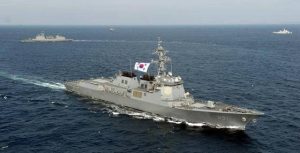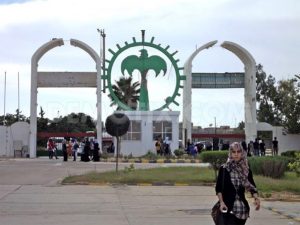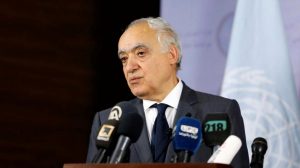South Korea said Thursday it had deployed a warship to Libya in an apparent show of force to secure the release of a national kidnapped along with three Filipinos in the south-western region.
The vessel, Munmu the Great, which takes part in anti-piracy operations in the Gulf of Aden, was on its way to Libya, Seoul officials said Wednesday.
The warship is also preparing for all possibilities including the need for military support, a South Korean defense ministry spokesman said.
“On the first day he was abducted, the president ordered the government to do its utmost with all resources the country has,” The South Korean President’s spokesman Kim Eui-kyeom said.
“The government has been maintaining a close cooperation system with the government of Libya and other allies, such as the Philippines and the United States, since the day of the incident for his safety and release.” He explained.
A video footage showed the South Korean captive asking the President to help win his release, and so did the three other abducted persons who are from The Philippines.
A Libyan security source said the Head of the Presidential Council order security apparatuses in Tripoli to follow the issue of the kidnapped foreigners, adding that fingers are pointed at IS militants, while other reports say they are kidnapped by other armed groups.
Sources in southern Libya said a man named Tariq Ehnish is the kidnapper and he wishes to use the four persons to free his bother Al-Mabrouk Ehnish who is arrested by the Tripoli-based Special Deterrence Force.
Ehnish stormed into the Man-Made River’s headquarters and burnt power generators and other stuff, then blocked water supplies to Tripoli and other cities for days in order to press the SDF to release his brother, who is a man linked to Gaddafi regime and is caused by the SDF of cooperating with people loyal to Saif Gaddafi to advance on Tripoli and destabilize it.
Nicolas Sarkozy faces formal investigation over alleged Libya funding
France’s ex-president is accused of receiving €50m in campaign funds from Muammar Gaddafi
The former French president Nicolas Sarkozy has been placed under formal investigation for illegal campaign financing, accepting bribes and the misappropriation of Libyan state funds over allegations that he received millions of euros in illegal election campaign funding from the regime of the late Libyan dictator Muammar Gaddafi.
Sarkozy, France’s rightwing president from 2007 to 2012, was released on bail on Wednesday after two days of questioning in police custody by investigators specialising in corruption, money laundering and tax evasion as part of an inquiry into whether Gaddafi and others in Libya illegally financed his successful election campaign in 2007.
The investigation is potentially France’s most explosive political financing scandal in decades. The allegations of illegal campaign funding by a foreign dictator on a massive scale are unprecedented and are the most serious accusations levelled at a former president in recent French history. Sarkozy has repeatedly denied the allegations, dismissing the claims as “grotesque”.
Under French law, being put under formal investigation means there is “serious or consistent evidence” that points to probable involvement in a crime. It is a step toward a trial but investigations can be dropped without proceeding to court.
The former president, 63, was allowed home on Wednesday night under bail conditions.
The two-day questioning is the first time Sarkozy has faced police in the case. A French inquiry into alleged illegal campaign funding from Libya was opened in 2013. The inquiry did not name anyone as a suspect, and has centred on claims of corruption, influence trafficking, forgery, abuse of public funds and money laundering.
Investigators are examining claims that Gaddafi’s regime secretly gave Sarkozy €50m overall for the 2007 campaign. Such a sum would be more than double the legal campaign funding limit, which was €21m at the time. The alleged payments would also violate French rules against foreign financing and declaring the source of campaign funds.
In April 2012, the investigative website Mediapart published a document it said was signed by a senior Libyan figure stating the regime approved a payment of €50m to “support” Sarkozy’s election campaign.
Previously, Sarkozy and Claude Guéant, a close ally and former minister, claimed the documents were false. A French court later declared that certain documents were authentic, allowing them to be used in the investigation.
Guéant has been officially put under investigation for organised fraud in the Gaddafi inquiry after allegedly receiving a bank transfer of €500,000, which he claimed had come from the sale of two paintings.
Sarkozy had until now refused to respond to a summons for questioning in the case.
The investigation appeared to accelerate after Ziad Takieddine, a wealthy French-Lebanese businessman who was close to Gaddafi’s regime, told Mediapart in 2016 that he had personally delivered suitcases stuffed with cash from the Libyan leader as payments towards Sarkozy’s campaign.
He said he made three trips from Tripoli to Paris in late 2006 and early 2007. Each time he carried a suitcase containing €1.5m to €2m in €200 and €500 notes, he claimed, saying he was given the money by Gaddafi’s military intelligence chief.
Sarkozy had a complex relationship with Gaddafi. Soon after becoming the French president, he invited the Libyan leader to France for a state visit and welcomed him with high honours. But Sarkozy then put France in the forefront of Nato-led airstrikes against Gaddafi’s troops that helped rebel fighters topple his regime in 2011.
In March 2011, Gaddafi’s son Saif al-Islam Gaddafi told Euronews: “Sarkozy has to give back the money he accepted from Libya to finance his electoral campaign. We financed his campaign and we have the proof … The first thing we’re demanding is that this clown gives back the money to the Libyan people.”
Sarkozy has dismissed the allegations as the claims of vindictive Libyan regime members furious over his participation in the US-led military intervention that ended Gaddafi’s 41-year rule.
Lawyers for Sarkozy have not commented on his questioning.
Another former minister and close ally of Sarkozy, Brice Hortefeux, was also questioned by police on Tuesday in relation to the allegations.
In January, Alexandre Djouhri, a French businessman suspected by investigators of funnelling money from Gaddafi to finance Sarkozy’s campaign, was arrested in Britain and granted bail after he appeared in a London court.
Djouhri was returned to pre-trial detention in February after France issued a second warrant for his arrest, ahead of a hearing scheduled for later in March.
Sarkozy has already been ordered to stand trial in a separate matter concerning financing of his failed re-election campaign in 2012, when he was defeated by François Hollande. That case, known as the “Bygmalion affair”, centres on an alleged system of false accounting used by Sarkozy’s office to conceal an enormous campaign overspend, mainly on the lavish rallies and US-style stadium gigs that cemented Sarkozy’s reputation as a political showman. Sarkozy has denied all allegations.
Comprehensive survey project for the basic and intermediate education sector at the municipal level
1- General introduction:
The idea of the project comes from the importance of providing a database on students,Education system stuff ,school facilities and teachers in the education sector at the level of in the basic and intermediate education (6-17 years) where its represent about 31% of the total population in Libya .
NESDB start implementing a comprehensive survey of the sectors of basic education and
secondary educational institutions in municipalities and in cooperation with the education offices within each municipality, a survey of economic, social, health and environmental aspects, to collect a compilation data and information on educational institutions to know the actual reality of the state of the education sector in the municipalities and the effectiveness and quality educational process, identify the problems and difficulties and the availability of services in educational institutions, which allows decision-makers to take the necessary measures that would address some of the problems and intervention laws and controls to create the appropriate environment for the Future proposed in this area of development projects.
2- Project goals:
– .Conducting a comprehensive survey on the basic and intermediate education sector in the targeted municipalities.
– Provide a database that supports decision-makers in developing future plans for the education sector.
3- Implementing Parties:
– National Council for Economic and Social Development – Bureau of Population Studies and Policies.
– Education Offices in Municipalities – Ministry of Education.
4- Data time period:
Educational year 2015-2016 , 2016-2017
5- Project expected outputs:
– A database on educational institutions in the targeted municipalities includes the following:
The numerical distribution of the population in kindergarten age (03-05 years)
according to provinces and by type (males, female) and explains their social,
economic and health status
The numerical distribution of the population of compulsory education age (06-17 years) according to provinces and by type (males, females) and explains their social,
economic and health status.
Population distribution in compulsory education age (06-17 years) according to
provinces and by gender (males, females).
Numerical distribution of student IDP’s of compulsory school age, by type of
provinces and by sex (males, female) and explains their social, economic and health
status
Numerical distribution of the population of compulsory education age according to
provinces and by type (males, females) who dropout from education.
Knowledge of the density of classrooms according to the basic educational stages
(primary – secondary) by provinces.
Providing information about students who are latecomer’s education, by educational
stage and sex .
Provide information on student employment by sex and by educational stage.
Provide information about repeaters students by sex and by level of education.
Knowledge of the rates of teachers for students and according to educational stages
by classifications of educational staff (Social specialist – Psychologist – Teacher of
special needs – supervisor and health paramedic.)
Assess the needs and interventions required in the social and economic aspects of the students in the educational level according to the results that describe their
social, economic and health conditions (kindergartens, basic education, and
secondary education).
Knowledge of diseases in all their classification in the educational institutions of students (kindergartens – basic education – secondary education) and according to
provinces and it will be easy to propose treatments and services necessary for them.
needs and shortages in school health offices by educational institutions and
provinces.
Knowledge of the distribution of displaced students at the level of educational
institutions and by provinces and thus knowledge of the distribution of their
households geographical and this will facilitate the provision of services necessary
for them.
Assessment of training needs in the educational staff through indicators describing their practical situation.
Assessment of the needs of the educational staff through indicators describing their
social, economic and health status.
Assessment of the needs of educational institutions through indicators showing the
shortage and needs in the educational buildings maintenance and the school
environment.
A Study on the status of education sector within the targeted municipalities
UAE used $30 billion of Libya frozen assets to support strongman Haftar, The New Arab
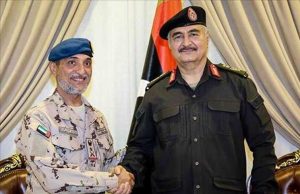
The New Arab unveiled Wednesday that the United Arab Emirates has used the Libyan frozen assets that are worth 50 billion dollars at its banks to send money to Khalifa Haftar and build his military empire in eastern Libya.
The New Arab cited a Libyan high ranking official as saying that over 30 billion dollars of Libyan frozen assets were sent to Haftar in funding venues and military support via accounts opened in countries and banks the UAE has shares in.
“Most of the money was sent through the Palestinian politician Mohammed Dahlan,” The New Arab reported.
It added that Libyans are involved in the “ripping off of Libyan assets” in the UAE, which the source said got the green light to do so from Europe,the US and even Russia “as all them have interests in Libya and in the UAE.”
The New Arab also said that the money sent to Haftar by the UAE also helped buy weapons for his forces in east Libya from countries like Ukraine, Russia and Canada, besides training most of his fighters in countries like Jordan.
Meanwhile, last Saturday, the second deputy of the High Council of State (HCS) Mohamed Imazib disclosed that the United Arab Emirates had provided the Libyan commander of east-based self-proclaimed army, Haftar, with portions of Libyan frozen assets in Abu Dhabi.
News Roundup
L’ambassade d’Italie en Libye a repris dimanche le traitement des visas pour les citoyens libyens à Tripoli et à Tobrouk. L’ambassade a expliqué via son compte Twitter que les nouveaux visas seront accordés avec un service amélioré et des prix plus bas et à moindre coût, ajoutant qu’elle a mis en place un site web spécial pour faciliter les réservations. L’ambassade d’Italie a commencé en juillet 2017 à accorder le visa Schengen aux citoyens libyens de la région de l’Est par l’intermédiaire de son bureau de Tobrouk, ouvert en juin.
Amazigh awakening: Libya’s largest minority wants recognition
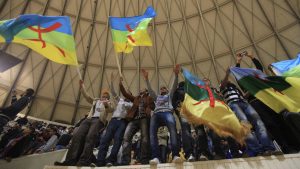
The Amazigh, or Berbers, Libya’s largest minority group, experienced harsh treatment under Moammar Gadhafi’s regime. Gadhafi’s so-called cultural revolution in 1973 criminalized Amazigh traditions, prohibited the use of their native tongue, Tamazight, and declared the Amazigh to be Arabs despite their being indigenous to the land.
For Gadhafi, the Amazigh represented a separatist threat to his efforts to consolidate power and proclaim Libya an Arab nation. Today, the Amazigh are thought to comprise an estimated 10% to 15% of Libya’s population of 6 million. While the Amazigh are dotted around Libya, they are concentrated in the northwest, with the town of Zuwara considered to be their unofficial capital.
Abdullah Kabousa, a Zuwara municipality councilor, explained during an Al-Monitor visit to Libya, “Our conflict with Gadhafi was about our culture. … We are a part of this country.” Anti-Gadhafi protesters and fighters took control of Zuwara on Feb. 23, 2011, a few weeks after the rebellion against the longtime leader erupted in Benghazi.
Today in Zuwara’s Martyrs’ Square, the Amazigh flag blows in the wind. Shop signs advertise products in large Tamazight script, with Arabic below in smaller lettering. At the Zuwaran branch of Zawia University, a faculty focusing on Amazigh studies has been inaugurated.
“Under Gadhafi, we could not study or speak our own language, but now we can,” said Zuwara Mayor Hafez Ben Sassi, speaking to Al-Monitor. “It is important to me. I feel like I am supporting my people. Things were great after 2011. … We were working together with fellow Libyans.”
Yet amid the Amazigh’s initial joy, storm clouds appeared, and their optimism soured. In 2011, the National Transitional Council — the temporary post-Gadhafi administration — adopted an interim constitution, and in late 2013, the Constitutional Drafting Assembly (CDA) was created to write a permanent constitution. Only two of the assembly’s 60 seats were allotted to the Amazigh, who felt insulted given their history and because they represent 10% to 15% of the population.
The Amazigh, challenging the assembly’s composition, refused to participate in it. They also boycotted parliamentary elections held on June 25, 2014. Despite the Amazighs’ boycott of the CDA, some of their leaders were able to review the various drafts of the constitution. Among them was Khairi Hamisi, a member of the Amazigh Supreme Council (ASC). Hamisi told Al-Monitor, “It is still not good enough. The constitution is wrong.”
The 18-member senior body of the ASC liaises on behalf of Libya’s Amazigh community with the United Nations, the CDA and the government. It is composed of six mayors, including Ben Sassi, and another 12 elected members.
The Amazighs’ key issue concerns equality. Hamisi said that the Amazigh — as the original inhabitants of what is now Libya — want their culture and Tamazight to enjoy the same status as Arab culture and the Arabic language. They want it enshrined in the constitution. Tamazight would thus be included in passports, for identification cards and on currency and so on.
For now, the temporary constitution remains in place, along with the Amazighs’ unfulfilled demands. Amazigh officials are currently threatening to boycott parliamentary elections and a referendum on the new constitution later this year if their rights and culture are not recognized.
“A certain degree of autonomy for the Amazigh is also desired in terms of education and local security,” Hamisi said.
Two events earlier this year greatly raised security concerns among the Amazigh. On Jan. 2, a militia in eastern Libya abducted Rabie Al-Jiyash, an Amazigh activist, allegedly for speaking Tamazight. He was later released. Days later, on Jan. 5, pro-government forces attacked territory controlled by predominantly Amazigh forces near the Tunisian border, leading the ASC to warn of a potential “ethnic war.” The reason for the attack remains unclear, but a cease-fire was declared and the attacking forces withdrew.
The ASC led the election boycott in 2014, but it has yet to decide which path to take regarding this year’s polling and the constitutional referendum. “If the constitution is not to our liking, we will either ignore it or vote against it,” Hamisi said. “If it is nonetheless approved by the rest of Libya, despite our displeasure, and elections go ahead, we have not yet decided whether or not to boycott the polls.”
“The constitution is the most important problem. [Our] recognition is crucial,” said Ben Sassi. “We want to be seen as equal, and people have to realize that the Amazigh are an ethnic majority not a minority.” In the eyes of the Amazigh, much of the argument for equality is based on the principle that Libya is not an Arab nation, but a multicultural state.
“Libya is not a one-dimensional country of Arabs that belongs to some sort of Islamic republic,” said Fathi Ben Khalifa, the former leader of the World Amazigh Congress, an international organization that protects and promotes awareness of the Berber culture.
“We are not part of the Middle East or the Gulf. We are Libyans, we are from North Africa,” he emphasized to Al-Monitor at his base in Zuwara. “Democracy is imperative, and this includes recognizing minorities.”
Ayoub Sufiyan, the head of the Apuleius Foundation, a think tank, believes the Amazigh movement has increased in fervor because of the ascendance of human rights.
“The Amazigh community wants its rights in light of an increased awareness about these rights,” Sufiyan said. “It will not stop until it gets what it wants. I think one day this will happen. Eventually Libya will recognize its identity. Libya is not an Arab state, it is multiethnic.”
Locals like Kabousa continue to insist they simply want to be equal. Comparing the Amazigh to the Native Americans, he remarked, “Everyone has come to live with us. This is ok, but please respect us.”
Oil major Total expands in Libya, buys Marathon’s Waha stake for $450 mln
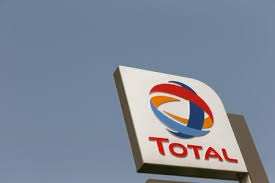
French energy company Total substantially raised its presence in Libya with the purchase of a 16.33 percent stake in Libya’s Waha concessions from U.S. Marathon Oil for $450 million on Friday.
The deal will give Total access to reserves and resources in excess of 500 million barrels of oil equivalent (boe), with immediate production of around 50,000 boe/d (per day) and“significant exploration potential” in concessions in the Sirte Basin, the company said in a statement.
“This acquisition is in line with Total’s strategy to reinforce its portfolio with high quality and low-technical cost assets whilst bolstering our historic strength in the Middle East and North Africa region,” said Total CEO Patrick Pouyanne.
Total has been in Libya for decades and holds a production share of 31,500 boe/d in 2017 from concessions in the offshore Al Jurf field and the onshore Sharara field. It also has a share in Mabruk field, which has been closed for several years because of poor security.
The Waha Oil Company, a subsidiary of Libya’s state-owned National Oil Corp (NOC), currently produces 300,000 boe/d, which is expected to rise to 400,000 boe/d by the end of the decade, Total said.
Other Waha stakeholders are NOC with 59.18 percent, ConocoPhillips with 16.33 percent and Hess with 8.16 percent.
The oil industry in OPEC member Libya has staged a partial recovery after being hit by blockades and armed conflict following an uprising seven years ago.
National production dropped to lows of about 200,000 barrels per day (bpd), before rebounding to 1 million bpd last summer.
It is still well under the 1.6 million bpd Libya was producing before 2011, and the industry has suffered continuing stoppages including the current closure of the southwestern El Feel field due to a protest by guards.
Waha is one of Libya’s main export grades. It is shipped from the eastern port of Es Sider, which was blockaded by an armed faction between 2014 and 2016.
Es Sider and other ports in Libya’s Oil Crescent are now controlled by the eastern-based Libyan National Army (LNA), which allowed the NOC to reopen them in late 2016.
FULL EXIT
Waha’s chairman said in November that the company was aiming to increase output to 375,000 bpd by the end of 2018, but faced major funding shortfalls and challenges in maintaining damaged infrastructure.
“Production and reserves growth is a key deal driver,” Woodmac VP for Corporate Analysis Luke Parker said.“There’s certainly upside from where we are today … Realising this upside would see Total create significant value through the deal.”
Marathon’s sale marks a full exit from Libya, a move it has been considering since at least mid-2013 but has been prevented from doing so by the NOC. [here]
“Our relentless focus on portfolio management has driven seven country exits since 2013 and generated proceeds of over $4 billion just in the last two years,” said Lee Tillman, Marathon president and CEO.
In a regulatory filing in 2011, Marathon valued the Waha asset at $761 million. At the time, oil prices were roughly double where they stand today. Brent was trading above $63 a barrel on Friday. [here]
“They received what we consider a pretty good price for the asset given that it was considered non-core,” said Jason Gammel, equity analyst at U.S. investment bank Jefferies.
He said Total were“probably better able to manage the geopolitical risk of a wide-base of operations across the Middle East.”
The Marathon sale marks the second exit for a U.S. company from Libya in recent years.
Occidental Petroleum Corp sold a 7 percent stake in the Nafoura oilfield to Austria’s OMV in late 2016.
HUNDREDS OF MIGRANTS PICKED UP BETWEEN LIBYA AND ITALY
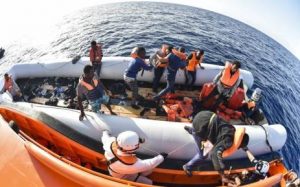
The first an inflatable dinghy that had broken down with 125 people on board off Zawiya, just west of the capital, Tripoli, said Ayoub Qassem.
Libya’s coastguard and an international charity ship picked up several hundred migrants on Saturday as smugglers trying to take advantage of calm seas launched a flurry of boats towards Italy.
Libyan coastguard vessels intercepted two of the migrant boats, the first an inflatable dinghy that had broken down with 125 people on board off Zawiya, just west of the capital, Tripoli, said Ayoub Qassem, a coastguard spokesman.
The second boat was turned back off Garabulli, east of Tripoli, and had 112 people on board.
One boat with 110 migrants on board made it as far as a rescue ship operated by Doctors Without Borders (MSF) operating about 21 miles from the coast west of Tripoli, which was preparing to deliver the migrants to Italy.
More than half the migrants on that boat were Nigerians, with the rest from other sub-Saharan African countries as well as two Palestinians.
Meanwhile the coastguard in Zuwara, a former Libyan smuggling hub west of Zawiya, said they had foiled a departure during the night and arrested some migrants whilst others had escaped with smugglers.
The coastguard posted pictures of detained sub-Saharan African migrants sitting in an inflatable rubber boat on the beach in the dark.
Libya is the main departure point for migrants attempting to reach Europe by sea. More than 600,000 migrants have crossed the central Mediterranean to Italy over the past four years as people smugglers took advantage of a security vacuum in Libya.
Since last summer the rate of departures dropped significantly after smugglers in the Libyan town of Sabratha struck a deal with the Tripoli government to halt their activities and were then pushed out of the town by rival armed groups.
Les garde-côtes libyens, soutenus par l’UE, ont également multiplié les interceptions, coupant souvent les bateaux de migrants avant qu’ils puissent atteindre les navires internationaux qui les conduiraient en Europe.
Stranded in Libya: ISIL’s Tunisian women and children
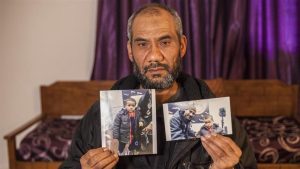
Baraa Zayani is nearly four years old and has spent more than half of his life in a Libyan prison. His only offence: he was born to a Tunisian father, now deceased, who joined the ranks of Islamic State of Iraq and the Levant (ISIL, also known as ISIS) abroad.
Zayani, and his mother Wahida Bin Mokhtar Rabhi, 30, have been held in the Maitiga prison in Tripoli since February 2016, after a US air attack exposed a network of ISIL cells in Sabratha, a coastal city about 130 kilometres east of the Tunisian border.
Rabhi, her son, and her husband, Ezzeddine Ben Habib Zayani, a mechanic who allegedly manufactured explosives and car bombs, were trying to flee south when Libyan militia members intercepted and began shooting at them.
Baraa’s father was killed and he and his mother eventually wound up in the custody of the Special Deterrence Forces, a militia affiliated with Libya’s internationally recognised Government of National Accord (GNA) in Tripoli.
More than two years later, Rabhi and her son now sit in diplomatic limbo, along with 36 other Tunisian women and children being held in the Maitiga prison. At least a dozen other women and children are being held in a separate facility in Misrata.
Ambiguous charges
Officials in the GNA have been engaged with Tunisian authorities to negotiate the return of these women and children for almost a year, yet, for various reasons, the cases have stalled.
The issue of repatriation for the Libyans is not confined to the imprisoned women and children, but also includes the question of suspected Tunisian ISIL fighters, said Ahmad Ben Salem, spokesman for the Special Deterrence Forces, in a phone interview.
According to Ben Salem, there are more than 60 Tunisian ISIL suspects currently in prison: some are awaiting trial in Libya; others are being held on ambiguous charges pertaining to Libya’s national security. Tripoli also seeks to return at least 80 bodies of alleged Tunisian ISIL fighters who died on Libyan soil and are in morgues.
Tunis and Tripoli are both dependent on numbers provided by Libyan militias – difficult to independently verify, said one Tunisian diplomat involved in the case. Even if the numbers are accurate, political control of Libya is split across four regions and numerous local actors, making it almost impossible to account for a complete number, said the diplomat, who asked to remain anonymous.
The Special Deterrence Forces said it is ready to release the women and children in Maitiga prison, but only with an official commitment from Tunis to address the question of repatriation of its citizens in its entirety.
Tunis, on the other hand, is focusing on repatriating the children, which has delayed any immediate resolution, said Mostafa Abdelkebir, a prominent human rights activist in Tunisia.
“Tunisia wants only the children and Libya wants the whole folder to be dealt with at once,” said Abdelkebir.
‘Children first’
Recently, in response to an inquiry made by a parliamentarian, Khaoula bin Aicha, the Tunisian foreign ministry said Libya previously refused to return the children through the Red Cross, seeking to coordinate exclusively with Tunisia instead. The language used in the published correspondence confirmed that Tunisian efforts are concentrated on imprisoned children and avoid specifically addressing female detainees.
The document indicated that proving the children’s parentage will be one of several steps in confirming the Tunisian citizenship of the remaining children – a task that might prove daunting. Tunis shut down both its embassy and consulate in Tripoli, in 2014 and 2015, respectively, after a number of its officials had been kidnapped by Libyan militiamen. It only reopened the offices in April 2016, leaving any child born during those two years likely unregistered with the state.
Yet, for the Tunisian “children first” approach, an even greater hurdle remains: Most of these women refuse to be separated from their children.
“The children are a protection tool for these women,” said Abdelkebir. The women fear that if the children are repatriated, then they will be forgotten, he explained.
They also feel safer with their children with them in prison, he said. “I understand them.”
Official Tunisian statements presumed these women guilty of ISIL affiliation, yet there is no evidence of due process or trial in Tunisia or Libya to determine their alleged status. Some women said they were either held against their will by their husbands, or were unaware of their husbands’ ties to the armed group.
Moncef Abidi, Rabhi’s brother, said his sister only began to see “suspicious behaviour” from her husband in late 2015, but was not able to seek help.
“The moment she felt the danger she became a hostage,” said Abidi. “She used to call her mother crying, saying she wants to come back … But he [Zayani] blackmailed her with her son. He told her that she can go back, but she would have to leave her son.”
Regardless of the nature of their ISIL affiliation, most of the women want to go back to Tunisia and are ready to stand before Tunisian courts, said Ben Salem.
“But they [Tunisian authorities] can’t just take the children and go,” he said.
Humanitarian case
To date, only one detainee has been successfully repatriated to Tunisia: a three-year-old orphan whose parents were killed in the same US air attack that affected Rabhi and her family. After a year in the Maitiga prison, Tamim Jandoubi was returned to the custody of his maternal grandfather in October last year.
But the case of the women and children has become a “humanitarian” one, said Ben Salem.
Many of these women and children require constant medical and psychological care. When his family was fleeing Sabratha two years ago, young Zayani was caught in the crossfire and hit by multiple bullets in his back and stomach. He was taken to a hospital in Tripoli to undergo surgery while his mother, who was taken to prison, was falsely told that her only son did not survive. A few months later, a video was released showing an emotional reunification of Rabhi and her son. Amid the hysterical cries and weeping of his mother, Zayani, wide-eyed and unsmiling, appeared to be distant and quiet for a child who has not seen a parent for months.
“If Tunis does not repatriate these children from Libya, what are they going to be when they get older? Doctors? Engineers? No, they are going to adopt radical ideas,” said Mohamed Iqbel Ben Rejeb, founder and president of the Rescue Association of Tunisians Trapped Abroad (RATTA), an NGO founded in 2013 to advocate for the safe return of families and children caught in conflicts abroad.
“What will their mothers teach them? To love their country? Their country abandoned them,” said Ben Rejeb.
‘No clear strategy’
A Tunisian delegation headed to Libya in April 2017 supposedly to meet the women and children, who had been bussed to an auditorium for the occasion, but failed to show up without an explanation – leaving the Libyans puzzled. Another delegation eventually went to Libya last October, as part of the effort to bring back Jandoubi – the first evidence of a Tunisian endeavour on the ground.
Tunisian authorities have accounted for the government’s lack of prior efforts, citing persistent security concerns. The Tunisian diplomat further attributed the slowness of the process to Libyan red tape and lengthy judicial proceedings.
But some analysts blame the ongoing plight of these detainees on the lack of a clear Tunisian strategy for ISIL returnees, more broadly.
“The issue is more political than it is legal,” said Ahmad Nadhif, a Tunisian journalist and the author of several publications on radicalisation in Tunisia.
Tunisian authorities “use legal justifications as an excuse”, said Nadhif. “There is a staunch rejection from within Tunisian society, [an unwillingness] to admit that Tunisia is one of the leading exporters of jihadists,” he added.
At least 3,000 Tunisians are known to have travelled abroad to join armed groups since 2011. An estimated 800 Tunisians have returned to the country – a number disputed by analysts.
Nadhif said the only Tunisian strategy today is “the same policy [Zine al-Abidine] Ben Ali employed to treat those who returned from Iraq, Bosnia and Afghanistan: to put them in jail”.
Tunisia enacted a new anti-terrorism law following two ISIL-claimed attacks on the Bardo museum and a Sousse beach resort in 2015, both of which were carried out by Tunisians trained in Libya. In the absence of rehabilitation and reintegration centres, courts are clogged with “terrorism” cases, with most returnees ending up in prison or under house arrest.
The question of how to deal with returning fighters and their families has periodically sparked fierce debates among Tunisians, with some secularist politicians even calling for them to be stripped of their nationality.
“The Tunisian society is experiencing what I like to call ‘severe denial,'” said Monia Arfaoui, a Tunisian journalist who specialises in studying radicalisation of women.
“[They say] terrorism is foreign to us, no, it is not. These people are a product of the same society and culture. They went to the same schools as us.
“This could explain why there has been a widespread rejection of the returnees,” she said, adding returnees will find their way back to the country eventually, whether legally or illegally through the border with Libya.
Libya: GNA Forms Committee to Conclude Truce in Sabha
UN Envoy to Libya Ghassan Salame has warned against maintaining the status quo in Libya and invited the country’s officials to launch initiatives to reach consensus.
His comments came during his meeting with members of the Libyan parliament on Friday.
Salame met on Thursday night with Libyan Army Commander Marshall Khalifa Haftar, with whom he discussed the political process and latest developments, according to statements issued separately by the two officials.
They also admitted that the UN plan for holding presidential and parliamentary elections before the end of this year was facing many obstacles.
Meanwhile, the United Nations Mission expressed its deep concern over the military escalation in Sabha, southern Libya, and said in a statement that the arbitrary use of weapons in densely populated areas must be stopped, noting that at least six civilians were killed and nine were injured in the city.
In this context, the Government of National Accord, headed by Fayez al-Sarraj announced the formation of a committee that would also include representatives from the Parliamentary and State Councils, to conclude a truce in Sabha, which is witnessing severe tension since last week.
The Presidential Council said in a statement that it “deeply regrets developments in the city of Sabha, and the clashes and fighting between Libyan brothers, in violation of their reconciliation agreement.”
The Council added that it “stands at an equal distance from all parties, and urges them to resort to dialogue and understanding.”
المركز المغاربي للأبحاث حول ليبيا
تعريف:
تأسس المركز المغاربي للأبحاث حول ليبيا في جوان - يونيو 2015 في تونس، وهو أول مركز من نوعه يعمل بكل استقلالية من أجل تعميق المعرفة بليبيا في جميع المجالات والقطاعات، ويرفد بالمادة العلمية جهود المجتمع المدني في ليبيا لإقامة الحكم الرشيد، المبني على التعددية والتداول السلمي واحترام حقوق الإنسان . مؤسس المركز: الإعلامي والباحث التونسي رشيد خشانة يقوم المركز بنشر مقالات وأوراق بحثية بالعربية والأنكليزية والفرنسية، ويُقيم مؤتمرات وندوات علمية، وباكورة نشاطاته ندوة حول "إسهام المجتمع المدني في إعادة الاستقرار والانتقال الديمقراطي بليبيا" يومي 5 و6 أكتوبر 2015 بتونس العاصمة.
موقع "ليبيا الجديدة"
موقع إخباري وتحليلي يبث الأخبار السريعة والتقارير السياسية والاقتصادية والثقافية والاجتماعية عن ليبيا، ديدنُه حق المواطن في الإعلام، ورائدُه التحري والدقة، وضالتُه الحقيقة، وأفقهُ المغرب العربي الكبير. يتبنى الموقع أهداف ثورة 17 فبراير ومبادئها السامية ويسعى للمساهمة في بناء ليبيا الجديدة القائمة على الديمقراطية واحترام حقوق الانسان والحكم الرشيد.

